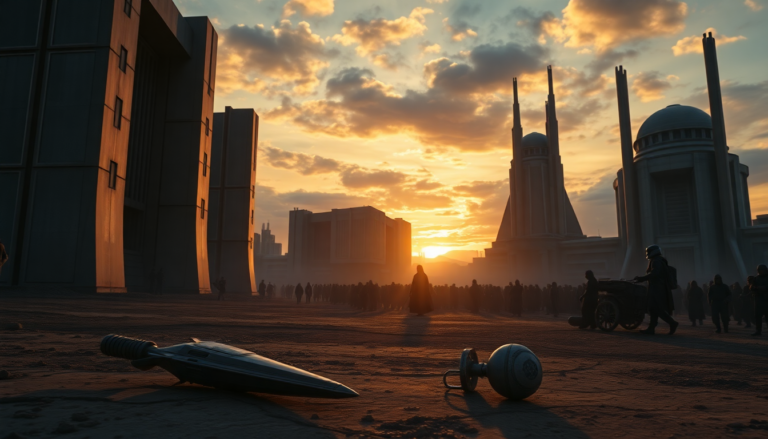Argomenti trattati
As the saga of Andor draws to a close, the final three episodes of season 2 offer a blend of suspense and resolution that keeps viewers thoroughly engaged. While these episodes might not reach the heights set by their predecessors, particularly episodes 7-9, they deliver a satisfying wrap-up to a series that has redefined the Star Wars narrative landscape. The journey of Cassian Andor, alongside beloved characters like Luthen and Kleya, culminates in a way that not only honors their stories but also seamlessly connects to the broader Star Wars mythos.
Setting the stage for Rogue One
Set a year after the impactful Ghorman Massacre and Mon Mothma’s daring escape from Coruscant, the final episodes of Andor lay the groundwork for the events of Rogue One. The narrative tightens around the secrets of the Death Star, revealing the stakes that Cassian, Luthen, and Kleya must navigate. There’s an undeniable tension as they uncover the galaxy-altering plots of the Empire, yet the focus shifts from explosive confrontations to intimate character moments that resonate deeply.
It’s fascinating to see how this series, often grounded in political intrigue and moral complexity, contrasts with Star Wars’ more action-oriented installments. I remember watching the earlier seasons, captivated by the character-driven storytelling that felt almost revolutionary within the franchise. The way the final episodes echo the quieter, yet equally impactful, moments of series like Game of Thrones is a testament to the writers’ skill in balancing grand narratives with personal stakes.
Character arcs and emotional depth
These last episodes shine a spotlight on character development, particularly focusing on the relationships between Luthen and Kleya. The flashbacks weaved throughout the narrative add layers to their dynamic, illustrating how their past intertwines with the present struggles of the Rebellion. Kleya’s mission to rescue Luthen, who finds himself in peril after discovering the Death Star’s construction, showcases a blend of urgency and emotional weight. It’s a tense sequence that, while thrilling, also feels deeply personal.
As the action unfolds, Cassian’s journey becomes increasingly pivotal. The episodes effectively juxtapose his mission with the larger conflicts at play, drawing viewers back to the gritty reality of life under the Empire. The scenes where Cassian rallies his allies to extract Kleya back to Yavin IV are filled with a sense of urgency, and I found myself on the edge of my seat, reflecting on the stakes not just for our heroes, but for the galaxy at large.
Thematic richness and political undertones
Andor has always been more than just a space opera; it dives into themes of sacrifice, rebellion, and the moral dilemmas faced by those fighting against tyranny. The concluding episodes don’t shy away from this complexity, instead embracing it wholeheartedly. Characters like Dedra Meero and Director Krennic serve as reminders of the stakes involved in this fight against oppression, and their arcs are crafted with a nuance that elevates the narrative beyond simple good versus evil tropes.
In a world where political corruption and the sacrifices required for freedom are ever-relevant, Andor resonates profoundly. The series acknowledges the gray areas of rebellion—how sometimes, in the fight against autocracy, one must make choices that haunt them. The final scene is particularly poignant, leaving viewers with a blend of hope and melancholy as it underlines the sacrifices made for the greater good.
A legacy that will endure
As I reflect on the journey of Andor, I’m reminded of how it has set a new standard for storytelling in the Star Wars universe. The performances have been stellar, with Elizabeth Dilau’s portrayal of Kleya standing out remarkably in these final episodes. Her intensity and emotional range bring a depth to the character that feels both authentic and compelling. Coupled with Stellen Skarsgård’s nuanced performance as Luthen, these moments create a rich tapestry of character-driven storytelling.
Andor has undoubtedly carved out its place in the hearts of fans, and as discussions about the series continue, it’s clear that its influence will echo in future Star Wars projects. Personally, I believe this series has raised the bar for how we can explore complex narratives within beloved franchises. Its ability to blend personal stories with larger political themes is a skill that many shows strive for but often miss.
Looking ahead
With the finale leaving us with so much to ponder, one can’t help but wonder what the future holds for the characters we’ve grown to love. Will we see familiar faces in upcoming projects? How will these stories continue to shape the Star Wars narrative? The sense of anticipation is palpable, and as many know, the Star Wars universe is always expanding.
In the end, Andor season 2 wraps up not just a story, but a legacy—one that pays homage to the sacrifices made by those who fight for freedom. As the credits roll, viewers are left not just with the echoes of a brilliant series but with the understanding that every character, every choice, contributes to the greater narrative of rebellion against tyranny.

